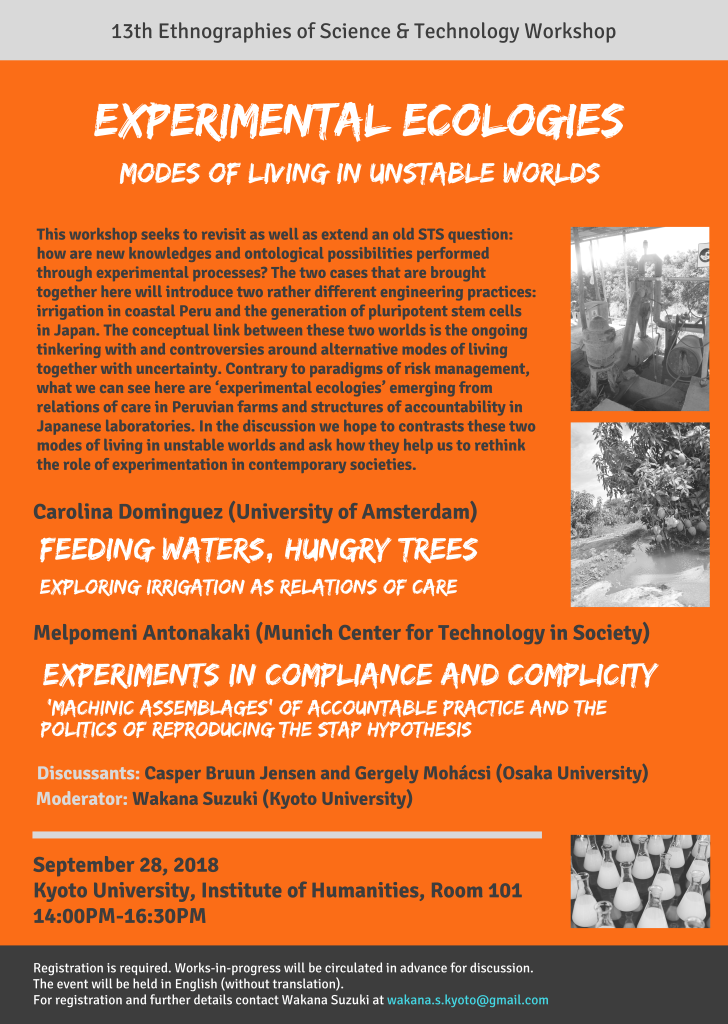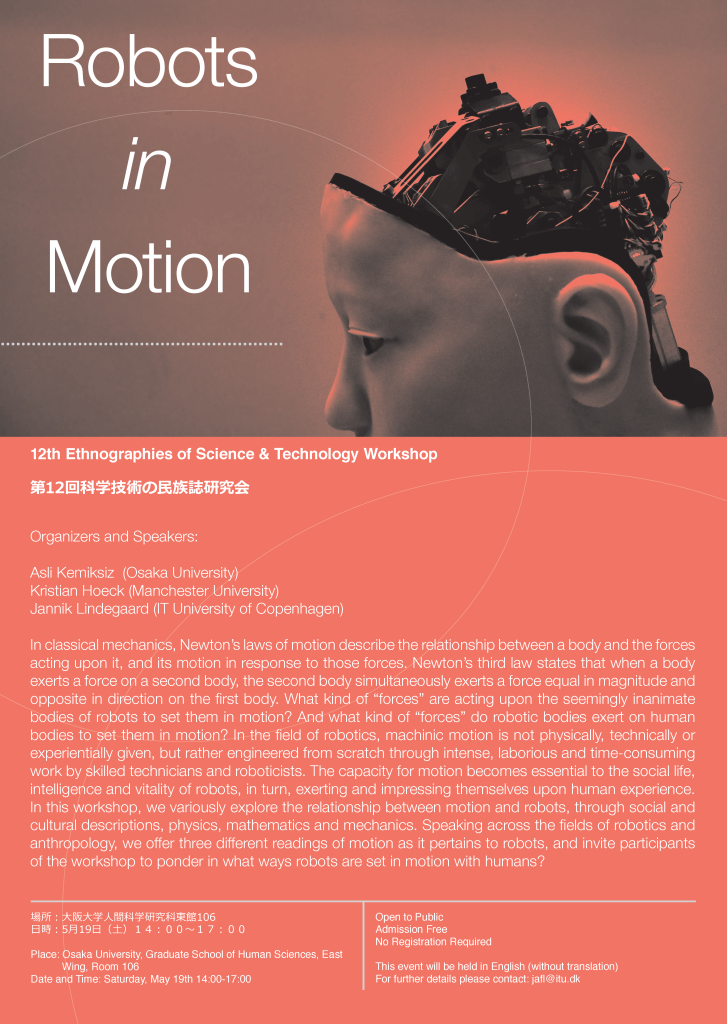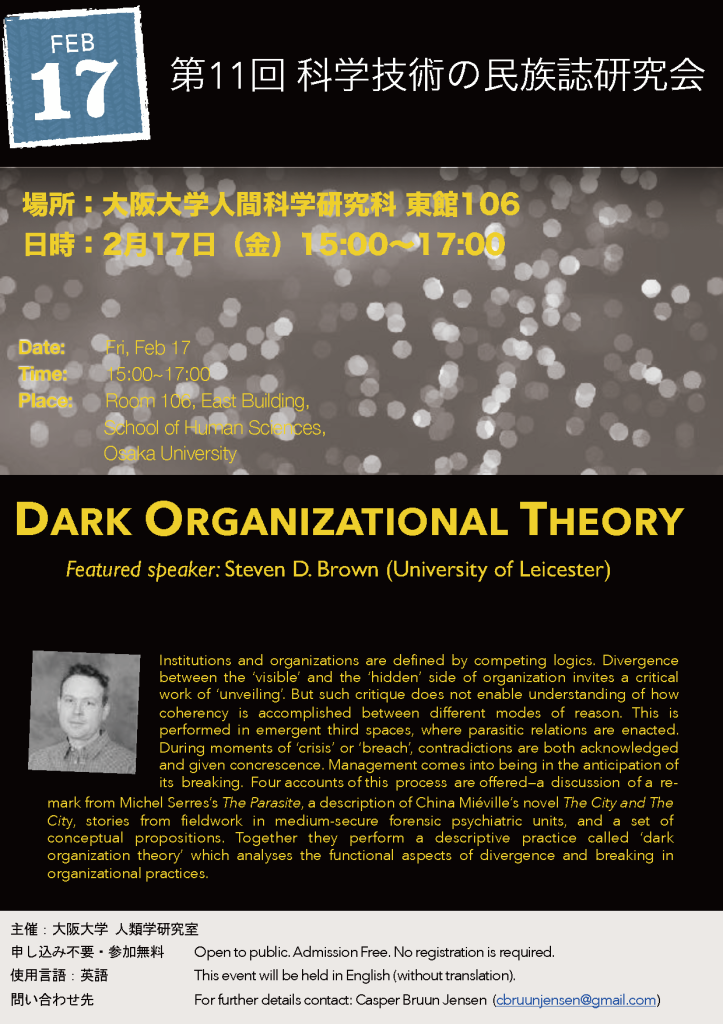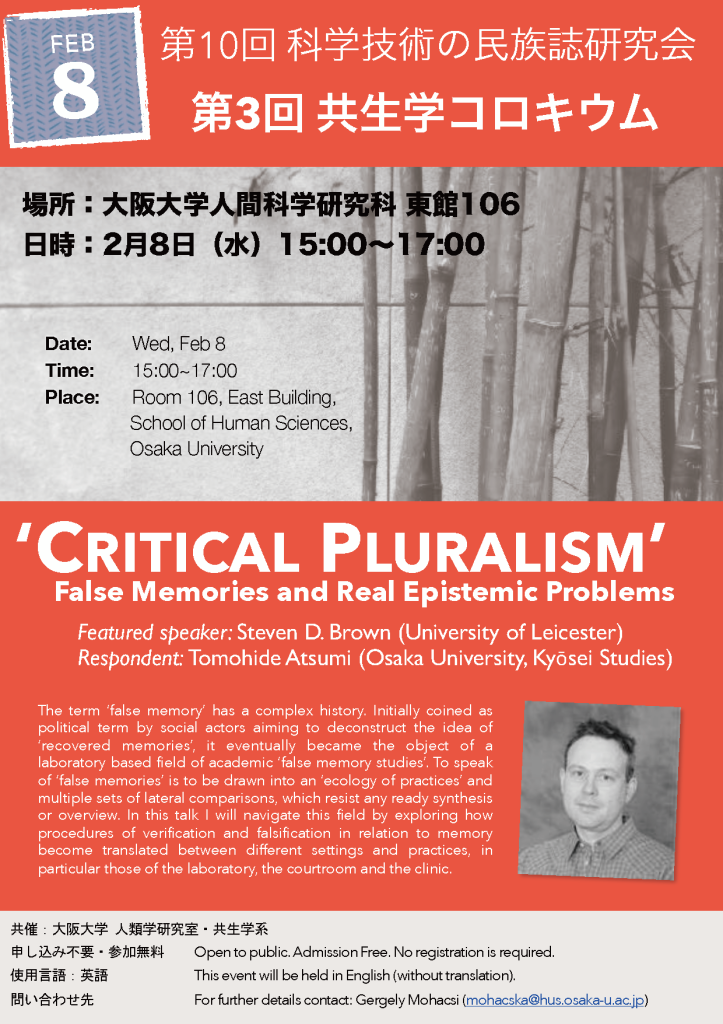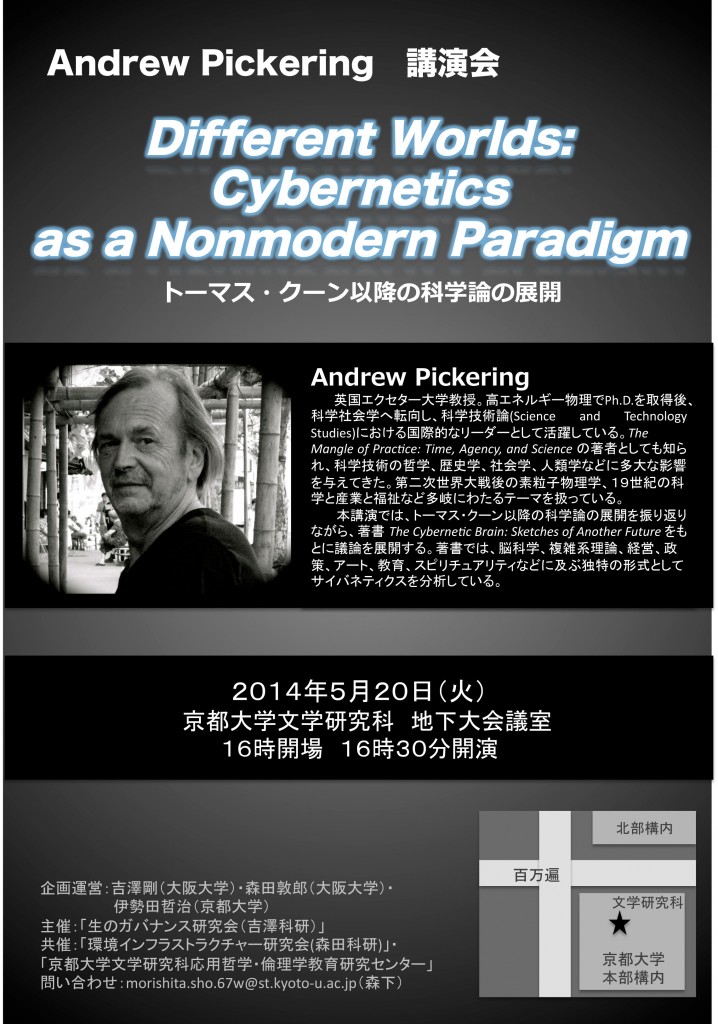Category Archives: WORKSHOPS
12th Workshop
11th Workshop
10th Workshop
9th Workshop
9th Ethnographies of Science & Technology Workshop
.
New Ontologies?
Some recent turns to ontology and their implications for anthropology
Lecture & discussion
Continue reading
8th Workshop
8th Ethnographies of Science & Technology Workshop
DIFFERENT WORLDS
Cybernetics as a Nonmodern Paradigm
Andrew Pickering
(University of Exeter)

.
Date and Time: Tuesday, May 20, 16:30-18:00
Venue: Basement Lecture Hall, Faculty of Letters Main Bldg, Kyoto University
Access: http://www.bun.kyoto-u.ac.jp/en/about/access
.
.
7th Workshop
.
7th Ethnographies of Science & Technology Workshop
EXPERIMENTAL SYSTEMS AND INTERSECTIONS OF KNOWLEDGE
A Dialogue between Hans-Jörg Rheinberger and Japanese Anthropology
6th workshop
6th Ethnographies of Science & Technology Workshop
第六回「科学技術の民族誌研究会」
At the Crossroads of Medical and Cultural Anthropology
– Culture, Medicine, Comparison –
文化と医療研究からみた現代人類学における『比較』の方法と実践
Date and Time: August 29, 2012, 15:00~18:00
Venue: G-sec Lab, 6F, East Building, Mita Campus, Keio University
Access: http://www.keio.ac.jp/access.html
Open to public. Admission Free. No registration is required.
This event will be held in English; summary in Japanese is provided after each talk.
For further details contact: Gergely Mohacsi (mohacska@z3.keio.jp)
PROGRAM
15:00 Introductory Remarks
Gergely Mohacsi (CARLS, Keio University)
15:15 Beyond the Horizon: An Inquiry into the Outermost Reaches of the
Anthropological Gaze and the Comparative Method
Allan Young (McGill University)
16:15 (Coffee Break)
16:30 Roundtable Discussion
Coordinator: Gergely Mohácsi (Keio University)
Participants:
Allan Young (McGill University)
Pino Schirippa (University of Rome)
Kitanaka Junko (Keio University)
Yamazaki Goro (Osaka University)
Hamada Akinori (JSPS)
17:30 General Discussion
Coordinator: Miyasaka Keizo (Keio University)
MOTION & ABSTRACT
The suggested motion for the roundtable discussion is:
Medical anthropology illuminates the recursive relationship between the anthropological tool of comparison and human differences.
Physicians and other medical professionals—not to mention patients—are only very rarely interested in the debates of medical anthropologists. One reason for this is that medical anthropology will never be able to cure people; one field, however, where medical anthropologists can contribute is (cultural) anthropology. Comparison is one issue/method where such a contribution is possible. It used to be the ultimate method in anthropology, but for a long time it is rather a target of criticism than anything else. Medical anthropologists, however, can provide many examples of how people—patients, physicians, epidemiologists, brain scientists, etc.—actually do comparisons all the time. We should rethink comparison as both a method and a daily practice (in medicine, and else) that links ethnography and anthropology. Whatever we think about its correctness or validity, comparison is one way people do their cultures, their religions, their sciences, their ethnicities, their gender, etc. It is therefore a very good example how anthropologists do exactly what their informants do—but it is very rarely admitted (despite the many other examples for such a recursive relationship in anthropology. The argument here is that admitting this relationship between the method and subject of ethnography may lead to new innovations in anthropological theory and practice, and that medical anthropology has a pivotal role there.
5th workshop
5th Ethnographies of Science & Technology Workshop
第五回「科学技術の民族誌研究会」
「存在論的転換」を再考する
Casper Bruun Jensen
(IT University of Copenhagen)
【日時】2012年5月7日(月)14時〜17時
【場所】大阪大学人間科学研究科(吹田キャンパス)2階 会議室B
アクセス:https://55099zzwd.coop.osaka-u.ac.jp/daigaku-hall/files/access.html
問い合わせ先:鈴木 和歌奈(wakana.s.kyoto@gmail.com)。
※ テキストについてはこちらから入手ください。
導入
「存在論的転換」という言葉が、昨今日本でも多くの人類学者の口に上るようになってきました。しかしながら、この言葉が何をさしているのかは必ずしも明白ではありません。たとえば、科学技術を研究する人類学者たちは、自然についての科学的事実が科学の実践を通して立ち現れるというSTSの議論に依拠して、知識についての人類学的研究をモノの自然的/技術的構成も含んだものに拡張することを主張してきました。一方、Viveiros de Castroらの影響を受けた人々は、存在論を世界認識のあり方の根源的な他者性をとらえる方法として主張しています。さらに、こうした議論は、Roy WagnerからMarilyn Strathernに至る民族誌的な実践のイノベーションと絡み合ってきました。そのため、現在、存在論をめぐる議論はある種の混乱状態にあるように思われます。今回の研究会では、存在論をめぐってデンマーク人類学会で戦わされた論争のコメンタリーとして、Christopher Gad, Casper Jensen, Brit Ross Winthereikが共著した論文を取り上げます。この論文で著者たちは、STSと人類学の異同に注目しながら、存在論をめぐる議論の状況の整理を試みています。当日は、著者の一人であるCasper Jensenさんとともにこの問題を考えたいと思います。なお、当日はテキストを読んでくることを参加の条件とさせていただきます。
検討テキスト:
Christopher Gad, Casper Bruun Jensen & Brit Ross Winthereik (manuscript) “Practical Ontology: Worlds in STS and Anthropology” (English translation of the original Danish text appeared in “Tidsskriftet Antropologi” in 2012).
4th workshop
4th Ethnographies of Science & Technology Workshop
第四回「科学技術の民族誌研究会」
Ontologies and Transubstantialist Ontology
Aurélie Névot
(CNRS, French National Centre for Scientific Research)
【日時】2012年4月9日14時より
【場所】大阪大学会館(豊中キャンパス)セミナー室1
アクセス:https://55099zzwd.coop.osaka-u.ac.jp/daigaku-hall/files/access.html
問い合わせ先:森田敦郎 morita@hus.osaka-u.ac.jp
ABSTRACT
The new millennium has so far marked an “ontological turning point” in anthropology. “Anthropology of Culture must be coupled with Anthropology of Nature” writes the French anthropologist Philippe Descola in Par-delà nature et culture, in his plan to rethink the Culture-Nature relationship by undertaking a “monistic anthropology” which would put an end to the traditional opposition between Nature and Culture and would then split with its institutional heritage, with its “constitutive dualism”. Another French anthropologist, Albert Piette, has recently criticized the relationist and culturalist “epistemological climate”, and in doing so, descolian anthropology. He foresees a method he calls “phenomenography” or else “ontography” in order to “break free of the socio-cultural focus to observe people, one by one, in their living continuity”. Thus, he proposes to develop an “ontic” perspective. It consists in studying the “existing”, in questioning how those beings are, how they exist in but also beyond their relationship with humans. In this sense, ontic methodology is anti-structuralist, anti-fonctionalist, anti-sociological, and anti-relationist. If P. Descola is a “relationist”, A. Piette could be seen as an existentialist. As for the Brazilian anthropologist Eduardo Viveiros de Castro, who argues that relationship is the “master notion” of anthropology, he advocates the study of the indigenous point of view, ardently criticizing the concept of “agency” and other notions referring to substantiality.In such an epistemological context, what could be said if “relationship” serves as a basis for representations of the world? If, more to the point, exchange is considered as an endogenous flagship concept, if the elements observed in the structure do not serve as markers for anthropological conceptualization, but if it is what links the elements involved in the local discourse that have to be conceptualized? What can one say if in-structure prevails over structure? If the relationship – the link associated with matter, substance – is the bedrock of the belief system? These questions emerge from studying ethnographic material from a Chinese minority, because the rituality of their shamans called “Masters of Psalmody”, bimo, does not fit de facto into the “relationist” theory. In their apprehension of the world, more than the ritual structure, it is indeed the movement/the shifting between bodies inside the ritual structure that prevails. We will try to defend this idea in order to draft a new ontological approach: “transubstantialist ontology”.
発表者紹介
発表者紹介:Aurélie氏は、雲南省の彝(Yi)族の文字に基づくシャーマニズムを研究されている方で、その事例に基づいてmultinaturalism批判などをしておられます。今回の発表では、彝族の事例とフランス人類学におけるmultinaturalismの受容と批判を結びつけたお話をしていただく予定です。
